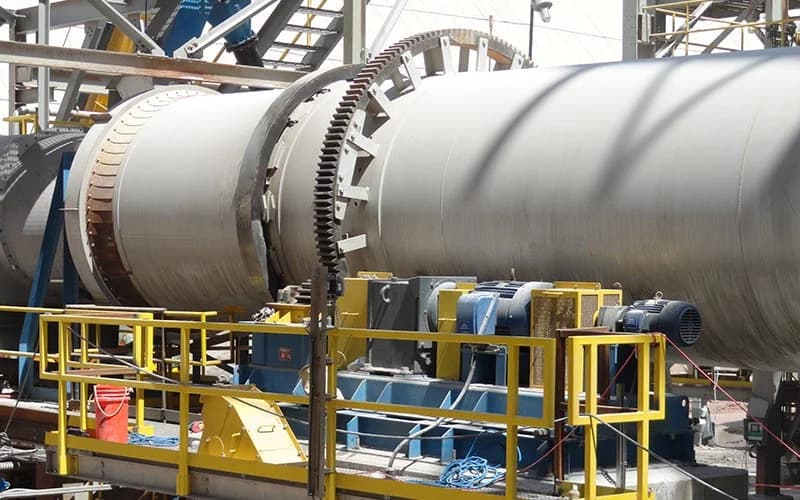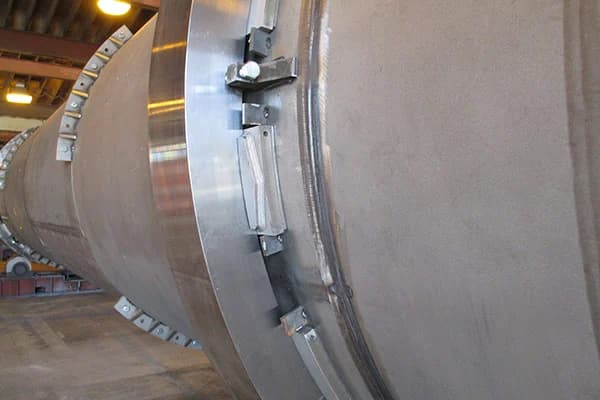The Importance of an Annual Rotary Drum Inspection
Rotary drums are an important piece of equipment widely used in industrial production, whether for drying, granulation drums or roasting, and regular annual inspections are essential to maintain process efficiency, extend equipment life and avoid costly downtime and repairs.
The need for annual rotary drum inspections
While routine day-to-day inspections by the operator are important for the timely detection of immediate problems with rotary drums, annual specialized inspections provide a more comprehensive and in-depth assessment of the health of the equipment. The key benefits of an annual inspection include:
1. Early detection of potential problems: Professional technicians are able to recognize early signs that could lead to serious breakdowns, thus preventing problems before they occur.
2. Avoid escalating problems: Identifying and resolving small problems in a timely manner can prevent them from becoming more serious failures.
3. Maintain reliable operation: Regular inspections help to ensure that equipment continues to operate efficiently and reduce unplanned downtime.
4. Save money: Although there is an investment involved in carrying out inspections, it is well worth it when compared to the loss of production and the cost of repairs caused by equipment failure.

Annual Rotary Drum Inspection
Depending on the characteristics and function of the rotary drum, the annual inspection should focus on the following key components:
1. cylinder shell: check for signs of wear, corrosion or deformation. This is particularly important for equipment that handles corrosive or abrasive materials.
2. drive unit: including motor, drive shaft, gears, etc. Check for normal operation and abnormal noise or vibration.
3. support structure: check whether the bearing and base supporting the cylinder are stable, and whether there is any looseness or deformation.
4. Feeding and discharging devices: Check the feeding and discharging ports for blockage, wear or deformation.
5. Internal components: If possible, it is necessary to stop the machine to check whether the blades, baffles and other structures inside the cylinder are intact.
6. sealing device: check whether the sealing ring, sealing cover, etc. are leaking or worn.
7. Braking system: for rotary drums with braking device, it is necessary to check the performance and wear of the brake.
8. control system: check whether various sensors, control panel, etc. are working properly.
9. Wear parts: Pay special attention to check those parts that are prone to wear, such as brake shoes (if applicable).
10. Overall operating condition: Observe the operation of the equipment under load, including noise, vibration, temperature and other parameters.
Regular inspections of these critical components can detect potential problems early and prevent minor malfunctions from becoming major problems, thus extending equipment life, increasing productivity, and reducing unplanned downtime and maintenance costs. More frequent inspections may be required for equipment that handles corrosive or abrasive materials.

Troubleshooting in rotary drum inspection
The following steps should be taken to deal with the faults found in the rotary drum inspection:
1. Fault diagnosis: carefully analyze the fault symptoms to determine the specific part and cause of the fault. Use professional diagnostic equipment and methods, such as vibration analysis, temperature detection, etc., to accurately locate the problem.
2. Formulate a repair program: According to the nature and severity of the fault, formulate an appropriate repair program. This may include simple adjustments, replacement of parts or overhaul, etc.
3. Timely maintenance: For faults affecting the normal operation of the equipment, maintenance should be carried out immediately. For minor problems, arrangements can be made to deal with them during scheduled downtime.
4. Replacement of worn parts: For those parts that are severely worn or damaged, such as seals, bearings, etc., they should be replaced promptly to prevent further damage.
5. adjustment and calibration: for some parts that require precise positioning, such as drives, support structures, etc., readjustment and calibration may be required.
6. Cleaning and lubrication: For some problems caused by contamination or insufficient lubrication, thorough cleaning and re-lubrication should be carried out.
7. System testing: After completing the repair, a thorough system test should be conducted to ensure that all problems have been solved and the equipment can operate normally.
8. Records and Analysis: Detailed records of the failure, repair process and results for future analysis and prevention of similar problems.
9. preventive measures: based on the experience of this failure, develop appropriate preventive measures, such as increasing the frequency of inspection of certain components, improve maintenance procedures.
10. Training of operators: If the failure is related to improper operation, the relevant personnel should be trained to improve their operation and maintenance skills.
Through these steps, the faults found in the inspection of rotary drums can be effectively dealt with to ensure the long-term stable operation of the equipment. At the same time, this systematic approach to troubleshooting also helps to improve the overall reliability and service life of the equipment.

TONGLI: Your Rotary Drum Solutions Specialist
TONGLI is a leading manufacturer of rotary drums offering a full range of services to meet your specific needs. Our areas of expertise include:
1. customized rotary drum manufacturing: we design and manufacture customized rotary drums to meet your unique application requirements, ensuring optimum performance and efficiency.
2. spare parts supply: we offer a complete range of quality spare parts for all brands of rotary drums, ensuring you have the parts you need to keep your equipment running smoothly.
3. Maintenance and Repair Services: Our experienced technicians provide professional maintenance and repair services to keep your rotary drums in top condition, minimizing downtime and increasing productivity.

Why choose TONGLI?
- Expertise and experience: With years of experience in the rotary drum industry, we have the knowledge and expertise to tackle the most complex challenges.
- Commitment to quality: We are committed to providing the highest quality products and services, complemented by stringent quality control measures.
- Customer Focus: We prioritize customer satisfaction, working closely with you to understand your needs and provide customized solutions.
Whether you need customized rotary drums, spare parts or maintenance services, TONGLI is your trusted partner. Contact us today to discuss your requirements and experience TONGLI’s exceptional service.

